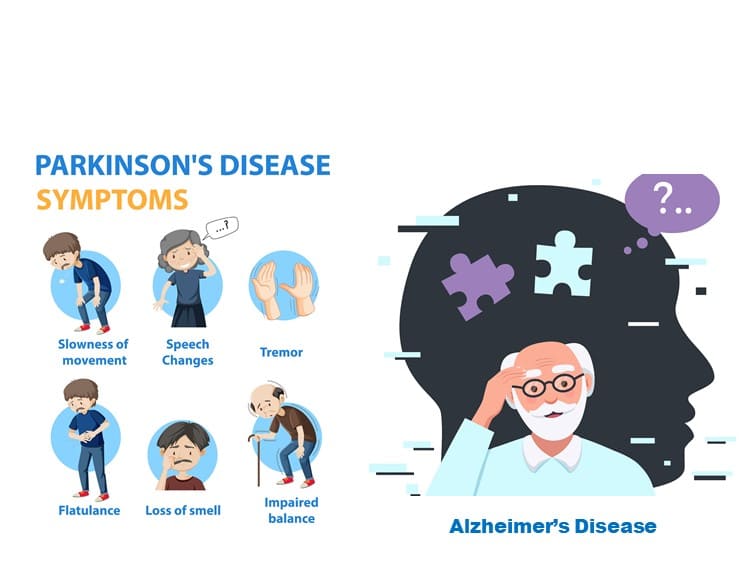Parkinson’s vs Alzheimer’s disease: Both these diseases are neurological conditions. Brain damage alters the function of nerve cells, resulting in alterations in movement, cognition, and behavior. Memory loss, forgetfulness, and trouble thinking and handling day-to-day living are all possible side effects of both illnesses. Dementia is the term for a group of symptoms like these.
Parkinson’s Disease
Parkinson’s disease can start sooner than Alzheimer’s disease, usually around the age of 60. Before the age of 50, between 5–10% of persons will have early-onset Parkinson’s disease. Parkinson’s disease progresses differently in different people. Parkinson’s symptoms usually appear gradually and progressively worsen with time. As Parkinson’s disease advances, individuals may find it more difficult to move or speak normally.
Alzheimer’s Disease
Alzheimer’s disease usually begins to manifest symptoms around the age of 65. Early-onset Alzheimer’s is a term used by healthcare experts to describe symptoms that appear before the age of 60. This is a rare occurrence.
Parkinson’s Disease Symptoms
- Tremor usually starts in the hand or fingers.
- Foot dragging is one example of slowed mobility.
- Rigidity
- Writing is challenging.
- When you move, slow down your habitual actions like winking, smiling, and swinging your arms.
- depression
- swallowing, chewing, or speech difficulties
- urinary issues
- constipation
- skin problems
- sleep disturbances
Alzheimer’s Disease Symptoms
- Issues with memory
- Difficulties finding words
- Visual and spatial awareness concerns
- Impaired reasoning or judgement
- Being easily lost
- Taking longer to do daily chores
- Having trouble managing money or paying debts
- Asking questions over and over
- Alterations in personality or conduct
- Words that you know but can’t remember
- Having trouble remembering names and faces
- Misplacing significant or everyday items is a typical occurrence.
- Having more difficulty planning or coordinating
- Everyday chores, such as balancing a chequebook, create difficulties.
Parkinson’s Disease Stages
- Stage 1: Minor symptoms that usually only affect one part of the body.
- Stage 2: Signs are worsening on both sides of the body, making daily chores tedious or difficult.
- Stage 3: Symptoms may impede with regular activities, and you may fall.
- Stage 4: Serious symptoms that necessitate the use of a walker or other forms of assistance to rise and walk.
- Stage 5: Being unable walk, reliant on a wheelchair; significant cognitive consequences.
Alzheimer’s Disease Stages
- Stage 1: Before the onset of symptoms
- Stage 2: Forgetfulness that isn’t severe
- Stage 3: A growing sense of amnesia
- Stage 4: Forgetfulness and trouble making decisions
- Stage 5: Personality shifts and a loss of autonomy
- Stage 6: Incapability to eat and movement issues
Treatment
Parkinson’s Disease
- Parkinson’s drugs lessen the symptoms of Parkinson’s disease by affecting the action of neurotransmitters (chemicals in the brain).
- Symptomatic treatments: These drugs do not treat Parkinson’s disease particularly, although they may help to manage some of the effects. Treatment for constipation or anxiety, for instance, may be prescribed by your doctor.
- Deep brain stimulation is a kind of Parkinson’s disease operation in which an electrical device is inserted in the brain to assist regulate movement signs. It may be useful for some people, and you may be able to lower the amount of Parkinson’s disease medicine you take.
- Occupational and physical therapy: Engaging with a therapist to obtain good control over your body motions can help you prevent falls and do the activities you need and want to do.
Alzheimer’s Disease
The following medications have been approved for the treatment of Alzheimer’s disease:
- Memantine
- Donepezil
- Aducanumab
- Galantamine
- Rivastigmine
Symptomatic medications, such as antidepressants or sedatives, may also be provided to ameliorate some of the disease’s consequences, such as depression or agitation.
Symptoms Related to Brain Function
Although there is some similarity, the overall cognitive signs that patients with Parkinson’s disease dementia, and Alzheimer’s disease suffer are distinct. Alzheimer’s disease initially impairs speech and memory, whereas Parkinson’s disease impacts dilemma, thinking ability, memory, and temperament. Individuals with Parkinson’s-related dementia frequently have hallucinations, delusions, and irrational thinking, unlike those with Alzheimer’s disease. Both of these disorders can cause despair, anxiety, and sleep problems.
Parkinson’s vs Alzheimer’s – Can you have both at a time?
Parkinson’s dementia is a diagnosis given to those who have Parkinson’s disease and later acquire dementia symptoms. But, if you already have Alzheimer’s disease and then have movement problems, you may be diagnosed with Parkinson’s disease.
Bottom Line
Parkinson’s vs Alzheimer’s Disease: If an individual in your family has been identified with Parkinson’s disease or Alzheimer’s disease, it’s critical that you take advantage of all available management options, including follow-ups with your neurologist, physiotherapist, occupational therapist, and nutritionist. You must also focus on home care to achieve the greatest quality of life.


